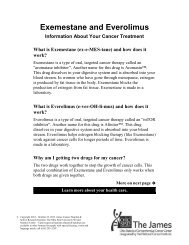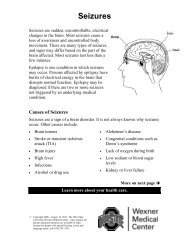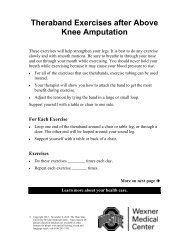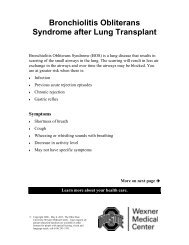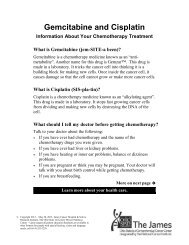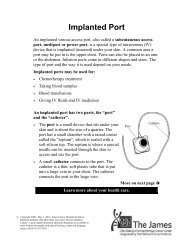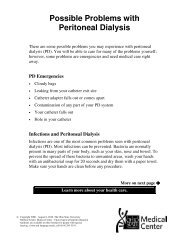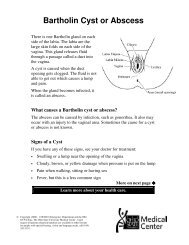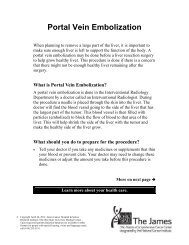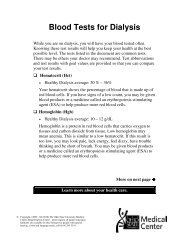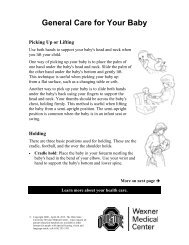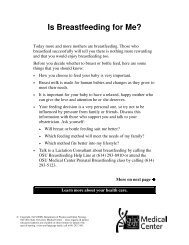Herpes Simplex Virus - Patient Education Home
Herpes Simplex Virus - Patient Education Home
Herpes Simplex Virus - Patient Education Home
Create successful ePaper yourself
Turn your PDF publications into a flip-book with our unique Google optimized e-Paper software.
© Copyright 2000 - March 2, 2011. The Ohio State University Medical<br />
Center, Women and Infant Nursing, OB/GYN Clinic - Upon request<br />
all patient education handouts are available in other formats for<br />
people with special hearing, vision and language needs, call (614)<br />
293-3191.<br />
Genital <strong>Herpes</strong><br />
<strong>Herpes</strong> is caused by a virus called <strong>Herpes</strong> <strong>Simplex</strong> <strong>Virus</strong> (HSV). <strong>Herpes</strong> is<br />
spread through skin-to-skin contact with an infected person. There are two<br />
forms of the herpes virus:<br />
• HSV-1 causes sores in or around the lips, mouth, and face, also called cold<br />
sores or oral herpes.<br />
• HSV-2 causes genital herpes with sores on or near the genitals. Genital<br />
herpes is a sexually transmitted infection (STI). It can be passed during<br />
vaginal or anal intercourse. It is also passed during oral sex or when there<br />
is mouth to genital contact.<br />
Signs of Genital <strong>Herpes</strong><br />
You may have some or all of these signs:<br />
• Blisters or sores that appear in clusters. Blisters may be red, itch or be<br />
painful. They may break open and leak out fluid and then dry up.<br />
• Fever greater than 100.5 degrees Fahrenheit or 38 degrees Celsius<br />
• Bigger lymph nodes. These are special glands that fight off germs.<br />
• Headache<br />
• Sore throat<br />
• Fluid or blood leaking from the vagina<br />
• Trouble urinating<br />
• Loss of appetite<br />
Learn more about your health care.<br />
More on next page
Page 2<br />
Testing and Treatment<br />
Your doctor or health care provider will give you a physical exam and ask<br />
about your health and sexual history. Tell your doctor when your signs started.<br />
Blood tests or a sample of the fluid in a blister may be sent to the lab to check<br />
if you have herpes.<br />
<strong>Herpes</strong> is a chronic infection. Your doctor will treat signs of infection. There<br />
is no cure for the virus. Medicines can be used to treat the pain from blisters<br />
and to shorten the time you have the blisters. Medicines may also be used to<br />
prevent new blisters from forming.<br />
<strong>Herpes</strong> infection has been known to cause cervical cancer in women. Talk<br />
with your gynecologist if you are diagnosed with herpes.<br />
Self Care<br />
To reduce the discomfort and spread of genital herpes:<br />
• Wash your hands with soap and water before and after touching blisters.<br />
• Keep the genital areas clean and dry.<br />
• If it is painful to urinate, soak in a tub of warm water to relieve pain or try<br />
warm cloth compresses to reduce irritation.<br />
• Some people find relief with ice packs. Always follow your doctor’s<br />
instructions for how long to use the ice pack.<br />
• Use mild soaps.<br />
• Wear loose fitting clothing. Do not wear panty hose or tight fitting jeans.<br />
• Wear cotton underwear.<br />
• Avoid touching the eyes after touching blisters. <strong>Herpes</strong> can spread to the<br />
eyes and cause serious infection, and in rare cases, blindness.<br />
• Avoid reoccurring blisters. Stress, lack of sleep, and other infections can<br />
increase blisters. Healthy lifestyle behaviors can reduce the number and<br />
severity of blisters.<br />
Protecting Your Partner<br />
<strong>Herpes</strong> can spread to a partner when no signs are present. A partner can be<br />
infected at any time. Protect your partner by:<br />
• Using a condom during sexual intercourse. Use of a spermicide may help<br />
too.
• Avoid sexual intercourse and oral sex when blisters are present. Avoid<br />
kissing if blisters or sore are present on the mouth or lips.<br />
• Limit sexual partners. Talk with new sexual partners about herpes<br />
infection. Look for signs of sores or blisters in a sexual partner.<br />
• Practice safe sex behaviors. While it is easier to spread the virus when<br />
there are blisters or sores, a partner can be infected when there are no<br />
signs.<br />
Protecting Your Baby<br />
If you are pregnant or think you may be pregnant, talk with your doctor.<br />
<strong>Herpes</strong> can pass from a mother to her baby during pregnancy and in some<br />
cases, be life-threatening to a newborn baby. It can also be spread during<br />
vaginal delivery of the baby. A cesarean birth may be needed if there is an<br />
active infection at the time of delivery.<br />
When to Call Your Doctor<br />
Call your doctor if you have any of these signs:<br />
• Fever greater than 100.5 degrees Fahrenheit or 38 degrees Celsius<br />
Page 3<br />
• Painful blisters or swelling on the penis, vagina, anus or mouth. Tell your<br />
doctor if there is pus or fluid leaking from the blisters.<br />
• Problems urinating<br />
• Headache that won’t go away or gets worse<br />
• Problems eating or swallowing from mouth sores<br />
For Support<br />
Contact the American Social Health Association at (919)-361-8488 or<br />
www.ashastd.org for more information, or to find a health clinic in your area.<br />
Talk to your doctor or others on your health care team if you have<br />
questions. You may request more written information from the<br />
Library for Health Information at (614) 293-3707 or email: healthinfo@osu.edu.



